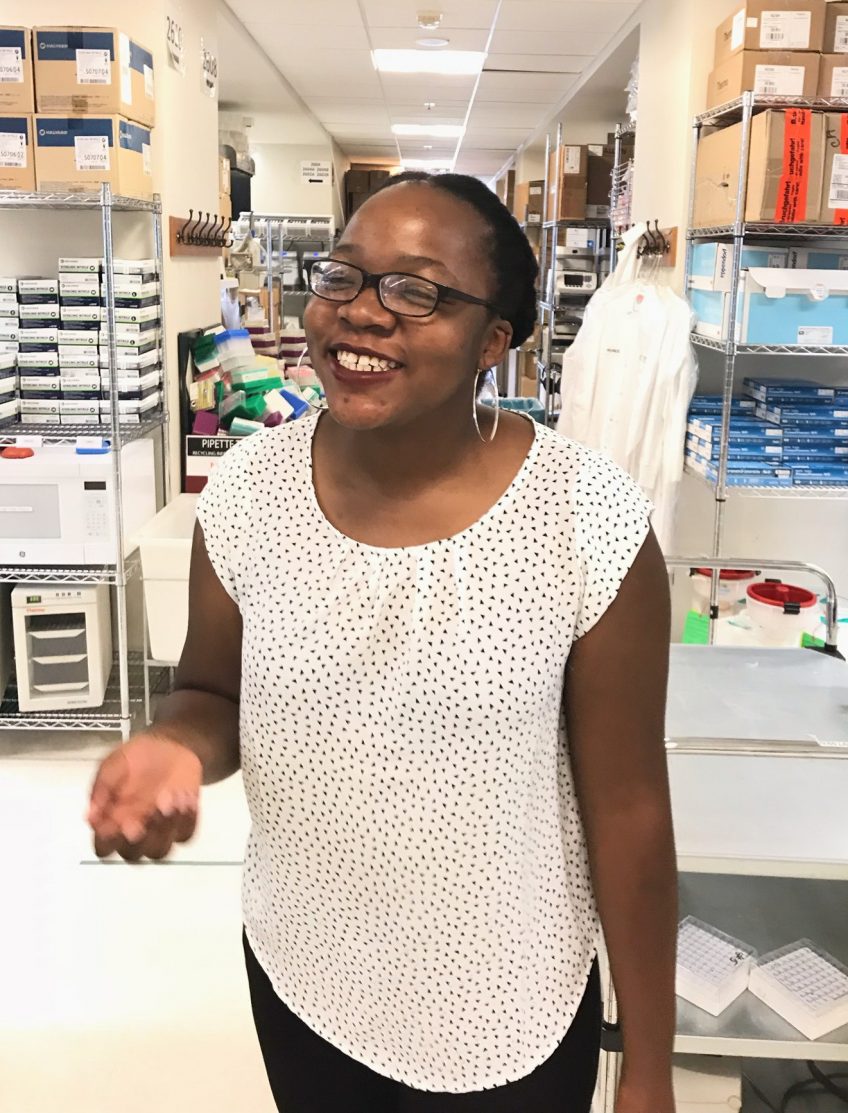This story is part two in a two-part series about Olubukola Abiona’s work with the Vaccine Research Center to develop a coronavirus vaccine. For more background on Abiona’s research and how she got to where she is today, see the April 16 issue for part one.
For the last three years, Olubukola Abiona has been working as a post-baccalaureate IRTA Fellow at the National Institutes of Health (NIH) Vaccine Research Center to develop vaccines for viruses like SARS, MERS and, most recently, COVID-19.
Scientist and Advocate
In addition to continuing the research she’s pursuing now, Abiona said that she hopes to pursue a doctoral degree as a first-generation Ph.D. student to better define and further her interests in virology and vaccinology.
“I love it,” Abiona said, referring to her current research with NIH. “After my first year, I realized, ‘Okay, this is what I want to do.’”
Along with finding validation in her interests, Abiona said that she overcame many challenges in her role as well. “I think that the biggest challenge, especially when I first got into this role, was learning that I have avoiceandasayin the process,” she said. “I’m surrounded by so many brilliant scientists on a day-to-day basis, so offering my opinion on things in the past, I wasn’t as vocal.”
Over time, Abiona says she learned that no matter what level you are in your training as a scientist, your opinion is valued and respected. “And that’s really amazing as someone who’s trying to go where [the scientists you work with] are,” Abiona said.
But, with every challenge and lesson learned, Abiona said that the most important takeaway she received from her experience was advocacy.
“As a black woman in STEM, there are challenges that are unique to my situation that I have to learn how to vocalize,” Abiona said. “Not to say that there weren’t resources, but I had to be proactive about finding opportunities and if I needed something, not just sitting there, but actively searching for those opportunities.”
At the Vaccine Research Center, Abiona said that she not only found opportunities to pursue the research she wanted to pursue, but mentors who were willing to help her succeed in her career and in her personal development.
A Love for the Lab
“The work I’m doing has so many implications,” Abiona said. “From a public health and political perspective, to touching on every different kind of person and social issue, this research has an intersectionality about it that is something close to my heart. I love thinking about problems in that sense – not just looking at one aspect of it, but multiple.”
Abiona explained that research has both short-term and long-term implications. Although vaccine development can go on for years and even the majority of someone’s career, Abiona said that even during that time you can contribute in a way that has almost immediate applications, like finding antibodies that help people in medicine and in the field. “I think that’s a beautiful thing because you can make an impact not just later on, but currently where you are,” she said.
In light of the current public health crisis, Abiona said that aside from a slight increase in hours, her role hasn’t changed much. “I think what’s great about our coronavirus program here is that we’re all about pandemic preparedness,” Abiona said. “So, when it comes to responding to this public health crisis, I’m basically doing the same things I would be doing, just with a different virus. Our idea is to have a generalizable approach to not just tackle one virus but to tackle multiple viruses if necessary.” Abiona said that outside of her work, she is astounded by the sacrifices people make on the front lines of fighting this current pandemic, not just in research, but in medicine.
“I get to see that firsthand,” she said, explaining that her whole household is essential during this crisis with both of her parents working as nurses and her brother as a pharmacy technician. “We’re just very careful at home,” Abiona explained. Even before this time of social distancing, she said that her parents would do “ankle-bumps” at home as a more sanitary way of showing affection, along with everyone checking in with each other to make sure they were okay.
“I operate from a place of hope,” Abiona said. “This is something that can be a learning opportunity. This is something that allows us to take a step back, look at our lives and understand more about the time we are spending [together]. This is not to be facetious, but operating from that place, a place of hope, allows other people to feel hope as well.”
And Abiona said that that is very important in the work she, her family and all frontline medical workers do. “If you just sit and despair, even though those are very strong feelings, you can lose sight of recognizing that this is a temporary feeling,” Abiona said. “This is a short period of time where we are going through something that is difficult, but that is also a part of life. This too shall pass.”

